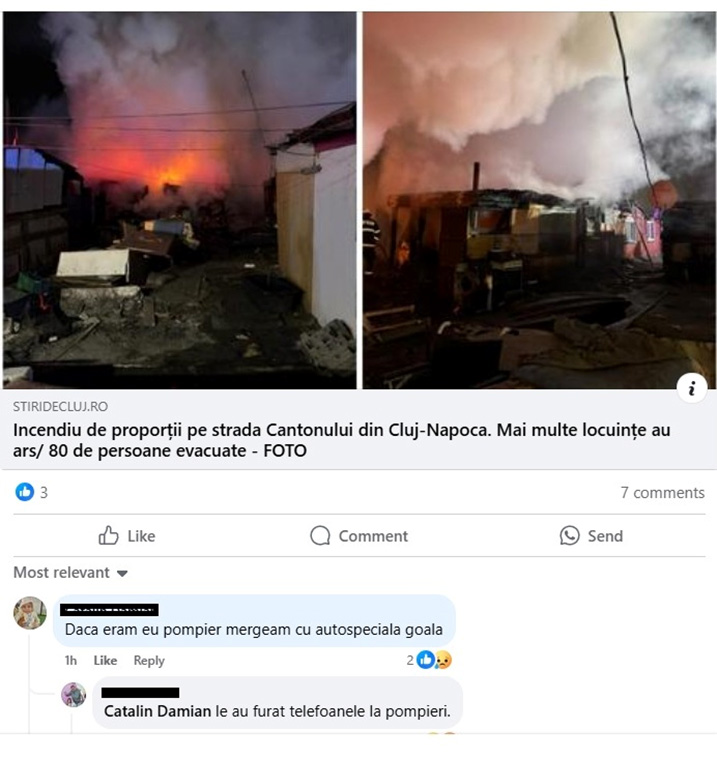Pata Rât, on the outskirts of Cluj-Napoca in Romania, is home to around 1,500 Roma people, many of whom were forcibly relocated there after the mass eviction from Coastei Street in 2010. Situated next to a city landfill, the area lacks essential infrastructure such as running water, electricity, and sewage systems. These conditions are not accidental but rather the result of long-standing systemic neglect and state failure to ensure equal access to housing.

Despite the structural roots of these issues, local media have frequently portrayed Pata Rât in a stigmatizing and dehumanizing way. A striking example is a regional radio station that described the settlement as “dangerous,” and its residents as “violent” and “suspicious,” referring to it as a bidonville a slum made of trash. Instead of addressing government responsibility in perpetuating such segregation, these narratives shift the blame onto the residents themselves.
According to Amnesty International (2011) and the European Roma Rights Centre (ERRC, 2020), Pata Rât is a textbook case of environmental racism where marginalized communities are placed in environmentally hazardous and socially excluded locations. The RELOCAL research project further emphasized how this type of spatial segregation of Roma communities in cities like Cluj-Napoca calls for urgent, inclusive urban policies.
Racist Reactions to Tragedy: The 2024 Pata Rât Fire
In October 2024, a fire broke out in the Pata Rât settlement, destroying several makeshift homes and displacing numerous residents. Although there were no fatalities, the event once again highlighted the community’s unsafe living conditions. Rather than triggering compassion or support, the fire unleashed a wave of racist commentary on Romanian social media.
Users mocked the disaster, with some calling the fire a “solution” to the so-called “Roma problem” and others suggesting that emergency responders should have refused to assist. Examples of hateful posts included: “If I was one of the firefighters, I would have gone there with my vehicle empty,” and “They (Roma people) surely stole the phones of the firefighters.”
Such reactions are a sobering reflection of entrenched anti-Roma racism in Romania. Investigative outlet Investigatoria documented the widespread online hate following the fire, showing that these sentiments are far from fringe they are disturbingly normalized. The EU Fundamental Rights Agency (FRA, 2018) has repeatedly confirmed that Roma in Romania face some of the highest levels of discrimination and exclusion in the EU. When a humanitarian emergency is met with open hostility, it underscores just how deep the problem runs.
TAAO and Its Romanian Partners: Confronting Digital Antigypsyism
These two cases were documented and brought to light by the Romanian partners of the Together Against Antigypsyism Online (TAAO) project a European initiative aimed at combating anti-Roma hate speech, particularly in online spaces. TAAO brings together civil society organizations from Germany, Hungary, Slovakia, the Czech Republic, Bulgaria, and Romania, and is coordinated by the ERGO Network, a coalition of grassroots Roma organizations across Europe.
In Romania, the project is implemented by Asociația Nevo Parudimos, which plays a central role in identifying and reporting online antigypsyism, supporting victims of hate speech, and providing legal and advocacy support. Their work in Pata Rât is a powerful example of local-level engagement rooted in monitoring, awareness-raising, and institutional pressure.
TAAO’s broader goal is not only to expose antigypsyist incidents but also to push for systemic change holding platforms accountable, advocating for inclusive digital rights, and strengthening Roma communities through digital literacy, legal empowerment, and coalition-building. The project also engages with policy-makers, journalists, and tech companies to challenge discriminatory narratives and foster a more equitable digital and public discourse.







